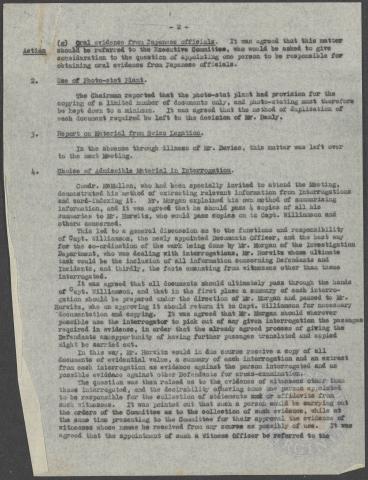
Page 2
| Parent | Minutes of Second Meeting of Evidence and Defendants Committee |
|---|---|
| Date | 12 March 1946 |
| Language | English |
| Collection | Roy L. Morgan Papers |
| Box | Box 1 |
| Folder | 1946, [International Military Trial of the Far East (IMFTE)]. International Prosecution Section (IPS) Civil Censorship Detachment. Confidential documents. |
| Repository | University of Virginia Law Library |
-2-
(g) oral evidence from Japanese officials. It was agreed that this matter should be referred to the Executive Committee, who would be asked to give consideration to the question of appointing one person to be responsible for obtaining oral evidence from Japanese officials.
2. Use of photo-stat Plant .
The Chairman reported that the photo-stat plant had provision for the copying of a limited number of documents only , and photo-stating must therefore be kept down to a minimum. It was agreed that the method of duplication of each document required be left to the decision of Mr. Danly.
3. Report on Material from Swiss Legation.
In the absence throng illness of Mr. Davies, this matter was left over to the next Meeting.
4. Choice of Admissible Material in Interrogation.
Comdr. McMillen, who had been specially invited to attend the meeting, demonstrated his method of extracting relevant information from interrogations and card-indexing it. Mr. Morgan explained his own method of summarising information, and it was agreed; that he should pass 4 copies of all his summaries to Mr. Horwitz, who would pass copies on to Capt. Williamson and others concerned.
This led to a general discussion as to the functions end responsibility of Capt. Williamson, the newly appointed Documents Officer, and the best way for the co-ordination of the work being done by Mr. Morgan of the Investigation department, who was dealing with interrogations, Mr. Horwitz whose ultimate task would be the inclusion of all information concerning Defendants and Incidents, and thirdly, the facts emanating from witnesses other than those interrogated.
It was agreed that all documents should ultimately pass through the hands of Capt. Williamson, and that in the first place a summary of each interro¬gation should be prepared under the direction of Mr. Morgan and passed to Mr. Horwitz, who on approving It should return it to Capt. Williamson for necessary documentation and copying. It was agreed that Mr. Morgan should wherever possible use the interrogator to pick out of any given interrogation the passages required in evidence, in order that the already agreed process of giving the Defendants an opportunity of having further passages translated and copied might be carried out.
In this way, M. Horwitz would in due course receive a copy of all documents of evidential value, a summary of cask interrogation and an extract from each interrogation as evidence against the person interrogated and as possible evidence against other Defendants for cross-examination.
The question was then raised as to the evidence of witnesses other than those interrogated, and the desirability of having some one person appointed to be responsible for the collect ion of statements and or affidavits from such witnesses. It was pointed out that such a person would be carrying out the orders of the Committee as to the collection of such evidence, while at the same time presenting to the Committee for their approval the evidence of witnesses whose names he received from any source as possibly of use. It was agreed that the appointment of such a Witness Officer be referred to the
